From Challenges to Triumphs: Lighting
the Way for Children in Need
Donna Atola, Kenya Field Communications Specialist; and Danette Kertz
OneChild Facilitators gathered in Kenya to help kids in hard places find hope, healing, and happiness.
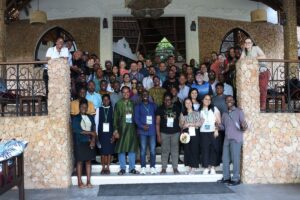
OneChild Facilitators from 11 countries met in Malindi, Kenya, for training and certification.
OneChild is a community that celebrates.
Every milestone reached, challenge overcome, and goal accomplished is cause for rejoicing.
OneChild instills this core value in staff members, Child Champions, and the kids in poverty they serve.
Keeping hope alive and vibrant is at the heart of our mission, made possible through earnest prayer and frequent celebrations.
But sometimes, finding joy in the hard places can be a challenge. Particularly when children endure extreme poverty or abuse or are unable to envision a path to a better life.
In the first week of May 2023, OneChild’s Partner and Program Facilitators gathered in Malindi, Kenya. These facilitators, armed with the most practical, relevant, and local expertise, serve as the vital bridge between our country offices and Hope Centers.
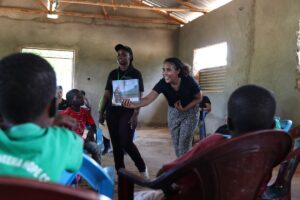
Trainer Dani leads a trauma healing group session with participating kids.
At this gathering, 74 participants from 11 countries, including 43 OneChild Facilitators, received training, resources, and certifications to benefit and uplift the more than 45,000 children in our program.
A contribution from a generous donor provided travel, lodging, meals, and training materials and helped support capacity-building sessions held over the course of eight action-packed days.
The event was enriched with specialized sessions presented by strategic partners, which equipped participants with tools to empower Child Champions in their mission to help children, families, and communities flourish.
Each morning began with devotions and praise before attendees split into groups for plenary sessions covering:
On the topic of child protection, any deliberate behavior or action that endangers a child’s safety, well-being, dignity, or development is considered abuse. Abuse can take many forms and include emotional abuse, exploitation, neglect/negligent treatment, harmful cultural practices, gender discrimination, mental/psychological abuse, physical harm, sexual abuse, and online abuse.
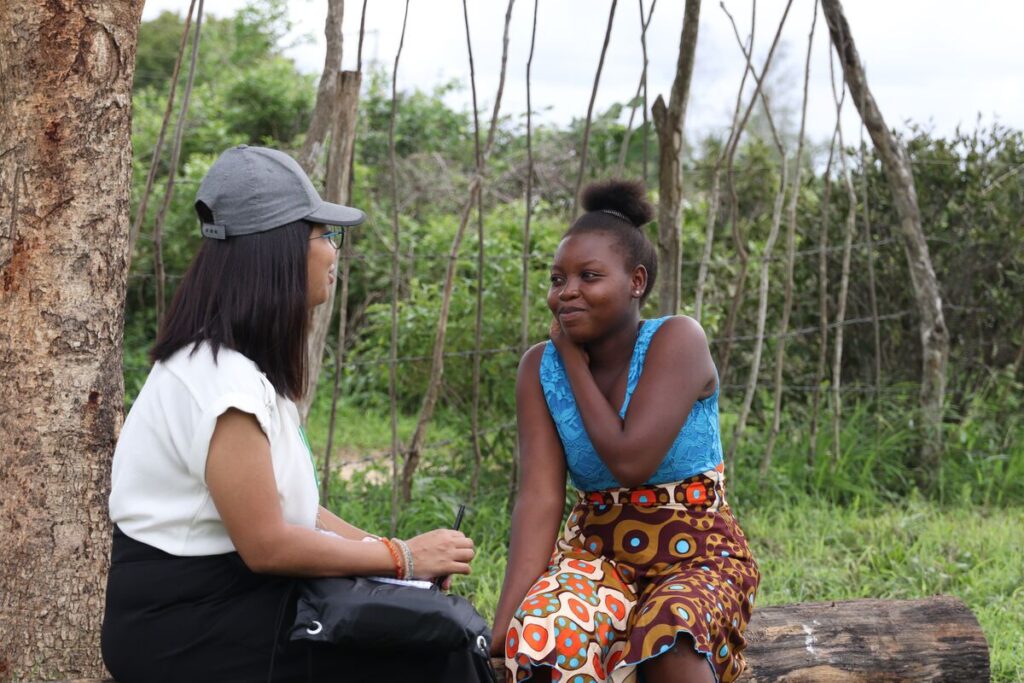
Dr. Kasturi talks with a young woman during one session.
Emphasis was placed on preventive measures as the cornerstone of effective child protection, with at least 70% of focus going toward prevention.
The Child Protection modules OneChild has in place provide guidance on abuse awareness, training for caregivers, and tools to empower children to advocate for their personal well-being, which was expounded upon during the summit.
Facilitators also received training in active listening skills and how to interpret the data collected from child experience surveys, as well as what healthy discipline looks like, how to talk to children about their own safety, and how to teach kids to protect themselves.
Facilitators were also equipped with pertinent questions to ask during a home visit to ensure the safety of the child.
After the facilitators had reviewed the signs of abuse, were trained on the tools of reporting, and were encouraged to partner with local agencies committed to justice and helping at-risk kids, they practiced these lessons by engaging with teenagers from our Hope Centers, collecting their stories and experiences.
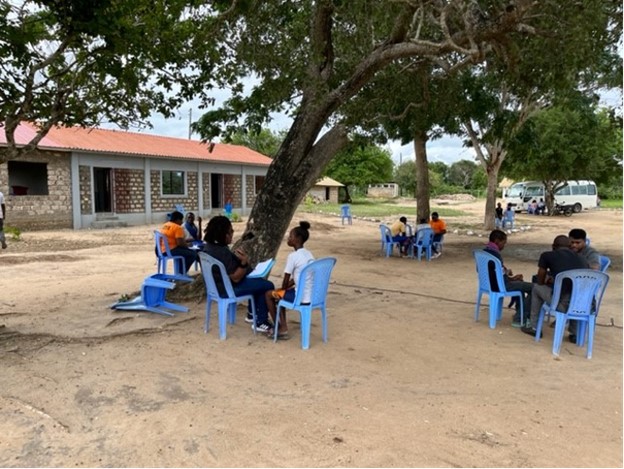
Facilitators meet with teens to put into practice what they’d learned about child protection.
Facilitators dedicated time to building rapport with the teens and their Child Champions before touching on the interview questions. Several reported that the youths they spoke with were well-versed in their rights and described their households as safe and loving.
But there were a few who recognized potential signs of abuse from the tearful responses they received and began the process of investigating and reporting.
The specialized training, certification, and practical experience the facilitators gained would enable them take lessons back to their fellow Child Champions on how to engage with families and communities to prevent abuse and recognize, report, and seek counseling and legal action in the event that abuse has already taken place.
Judith, who leads the team in India, had this to say about the sessions:
“One of the things that we have learned is to be able to understand where our children come from — to be able to help them in their personal growth, with dealing with trauma, and accessing those parts of them that we feel can help them grow.”
Child Champions can only be with the children in their care for so many hours per week. Although trauma prevention is ideal, it’s not always feasible, so the facilitators were also prepared to engage kids who have survived trauma using therapeutic play and stories from the Bible to support their healing.
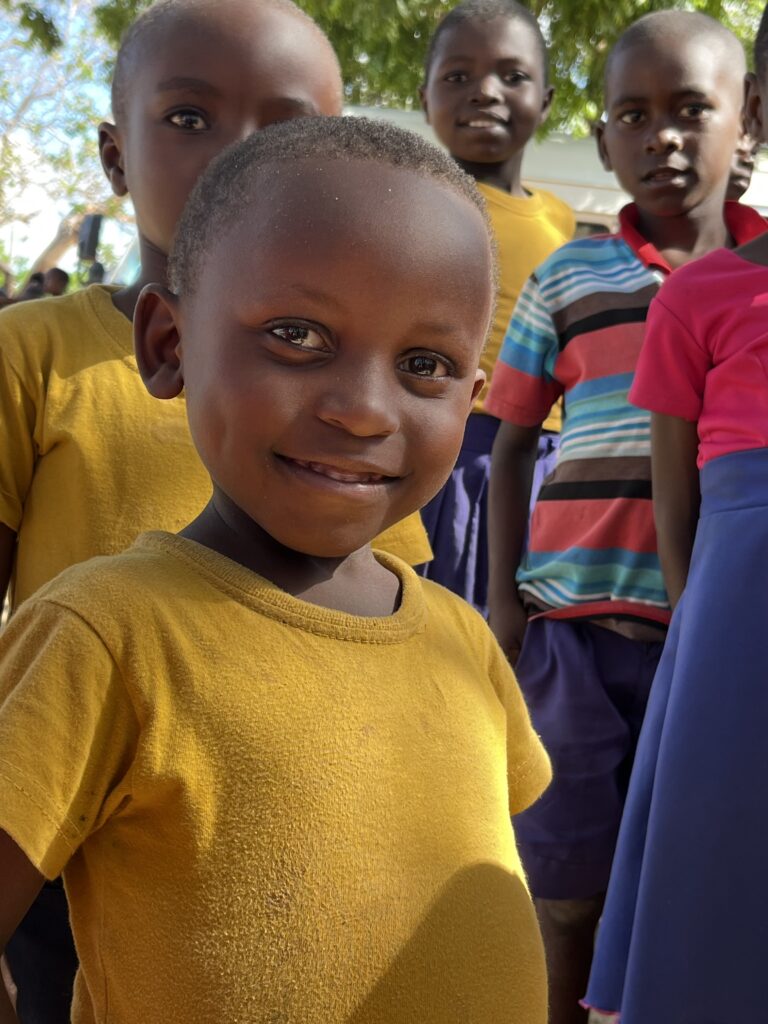
Facilitators learned how to nurture the “spark” within every child so that Child Champions can encourage children to dream and pursue future goals.
Arise believes that every child belongs in a thriving family. Led by trainers Dani and Alexa, participants walked through different scenarios in which trauma can show up in behavior — kids’ behavior tells a story, and that story can look different from child to child, with some detaching and others acting out.
They also reinforced that the child is not the problem, the behavior is the problem, and that their range of feelings is beautifully normal.
They showed the facilitators how to create consistency, a feeling of safety, and well-managed expectations for the groups Child Champions encounter at our Hope Centers and demonstrated how storytelling can put kids at ease enough to open up about their trauma.
When it comes to engaging families and youths, facilitators were shown how to actively encourage parents and guardians to be principal actors in the discipleship of their kids through biblically based, participatory, and interactive lessons.
The facilitators also helped caregivers identify their own community’s problems — especially those that affect children — and suggested solutions.
Tearfund is committed to answering God’s call to play a part in bringing an end to extreme poverty and injustice.
With the guidance of Tearfund’s experts, facilitators learned about positive youth development outcomes and how to nurture the “spark” within every child so that Child Champions can encourage children to dream and pursue future goals.
A spark differs from a profession. It is something that brings meaning, self-directed action, and purpose to a child’s life. A spark is an innate gift and interest that resides within kids, which can be nurtured and grown if the adults around them recognize their potential.
Sparks are not confined to one area of life but can be any quality or expression of how a child moves through the world. And when given the opportunity to thrive, that spark can play a pivotal role in making the world a better place for everyone.
After lessons, the facilitators were tasked with taking these concepts into the field. They conceptualized, prepared materials, and practiced active listening before visiting a Hope Center.
Facilitators met with teens and older adults, encouraged the elders to hear what the youths had to say about what motivates them, and offered options where potential sparks might be possible within their context.
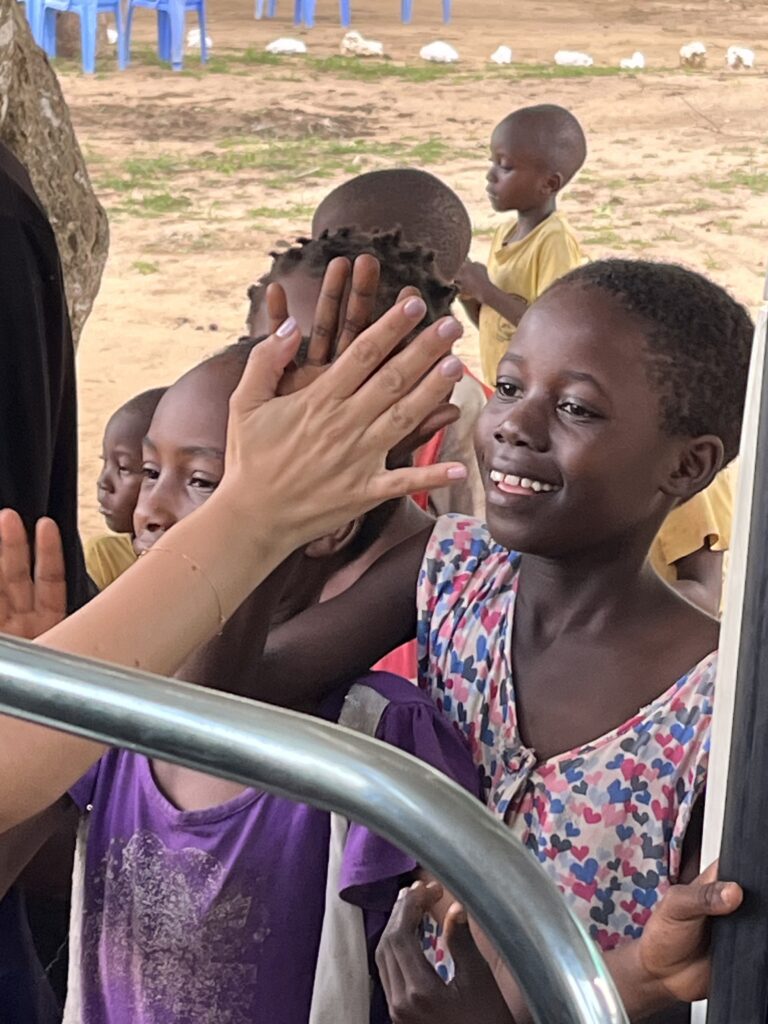
Children in the village say goodbye to the OneChild Facilitators as they leave.
One of the facilitators from the Dominican Republic, Neff, couldn’t wait to put all that he’d learned into practice.
“One thing that I’m going to start doing right away when I get back to the Dominican Republic is to be able to meet with the Child Champions … to have gatherings … to talk about the several things that we can implement to be able to bring [forth] the potential that’s within our children,” Neff said.
The concept of Savings Groups, initiated as part of a pilot program in several countries, introduced facilitators to the transformative power that sound financial habits and personal finance management are having on families.
The Chalmers Center’s mission is to equip local churches to address the broken relationships at the root of material poverty. Chalmers believes the materially poor are whole beings, bearing God’s divine image and deserving holistic engagement, so their program, RESTORE, builds on Savings Groups practices that have evolved over decades.
Hear facilitator Salvador’s takeaways from the summit:
Through collaborative efforts, RESTORE has reached more than 1.8 million people in poverty in 25 countries in Africa, Asia, and South America.
What this means for the kids in our Hope Centers is that their caregivers can build financial skills and knowledge that result in earnings management and income-smoothing (deferring revenue during a good year if the following year is expected to be a challenging one), bringing stability and better health to the entire household.
Facilitators from each country left the summit feeling encouraged and motivated to create action plans for next steps to use the information they received during the sessions.
During the course of the summit, the facilitators recognized that crises aren’t restricted to natural catastrophes or health emergencies — that abuse, the neglect of God-given talents, and being entrenched in a multigenerational cycle of extreme poverty are just as much of a crisis as a cholera outbreak, earthquake, or typhoon.
But unlike those disasters, there’s something they can do to bring hope to kids experiencing these difficulties.
“We are the ones who own the work in our countries, and we’ve got to do the same for our churches and for our children,” said Junior, from the Dominican Republic. “And also, I think what we have to do when we get back is start planning because we have a lot to do … we have a lot of churches to bless, and I believe all of this information, all of these trainings were just a blessing to us.”
To read more stories about how Child Champions are helping kids, families, and communities, visit our blog!
Help us go further into the hard places to help kids living in poverty by giving to the OneChild Partners Fund.
Our accountability to our donors is one of our highest priorities. Our goal is to use the funds entrusted to us as wise stewards. To do this requires continued monitoring of our fund distribution. OneChild is also a member in good standing with the Evangelical Council for Financial Accountability (ECFA)
Read Santino’s story as he shares the memorable experience of meeting his sponsors.
Help meet critical needs in hard places.